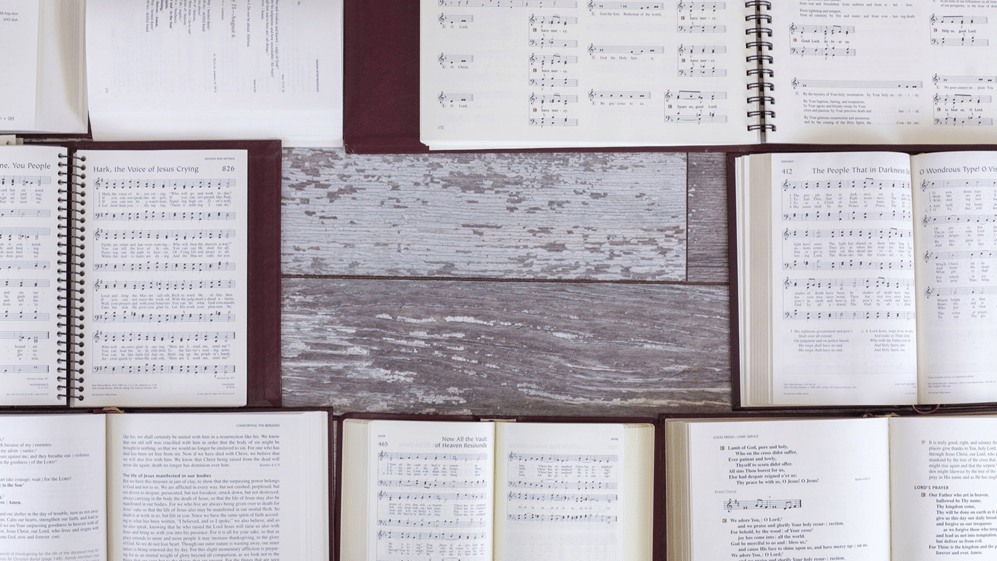I was recently gifted a book of the poetry of George Herbert. Herbert was a seventeenth-century aristocrat-turned-deacon in the Church of England whose English-language poems were published posthumously. Herbert’s almost exclusively Christian poetry is a beautiful expression of faith. Herbert captures the wonder of God’s love for us, the enormity of Christ’s sacrifice on the cross, and the joy of our salvation again and again. In his work, in fact, his poems remind me of our hymnal and the poetic expressions of faith captured therein. Reading his poetry inspired me to think of hymns as poems as well.
Hymns without music?
We have the privilege of listening to and reciting poetry weekly, if not daily, thanks to our hymnal. Most of us are probably familiar with the poetic character of hymnody, realizing that hymns use meter, rhyme, stanza, and poetic language to convey theological truth. The poetry of hymns, though, is closely tied to the music paired with the text. How often do we hear a hymn spoken or see the text without expecting to sing it? When I see a hymn text I know, I find it difficult to read it through without singing it in my head. The music is, indeed, essential to the hymn and often aurally illustrates the text; however, is there an advantage to reading the text of hymns as though they were spoken poetry? Is it ever appropriate to divorce the text of a hymn from the tune?
Although I think that the music is essential to the hymn in the end, taking the text out of the music can give us a clearer understanding of its meaning. Reading hymns out loud like poetry can give us insights that we do not usually discover when we just sing the hymn. Then, when we once again pair the music with the text, we have a deeper understanding of what we are singing.
Something different
Initially, hearing the text of a hymn simply spoken instead of sung, or speaking it yourself, is a little shocking. We are simply not used to hearing it that way. When we hear the text of a hymn spoken, then, we are almost shocked into listening to it attentively. You may already know the text by heart, but hearing it spoken gives it just enough novelty that it causes us to stop and listen carefully. When that happens, we may hear something we have never noticed before, or we may hear the text in a new way altogether.
Unusual phrasing
Hearing hymns spoken rather than sung can also show us the way the rhythms of the text might sound different apart from the musical phrasing. When we remove the music, we can speak the text as we would naturally and hear how the phrasing might be slightly different than when paired with the melody. Maybe we always thought a certain line of text in a hymn meant something different than it actually does because of the way the text was phrased musically. Speaking the text can help us discover and understand such discrepancies in phrasing.
Devotional
I find that I can get distracted by a hymn’s tune and whether or not it appeals to me, and then fail to mediate on the hymn as I should. Taking away the music can ensure that we actually listen to the text itself and focus on its meaning rather than on its melody. Speaking hymns, then, can result in a good devotional exercise. Focusing on the text rather than the tune allows for clearer meditation on the words themselves.
It’s fun!
Speaking the text instead of singing it can just be fun as well. Of course, the point of a hymn is not to entertain us, but reciting the text can be an enjoyable way to learn it even better. Using different inflections or speaking hymn texts dramatically to a group of others can create fun memories and be an enjoyable activity. I am considering trying this out in my classes this year as a way for my students to memorize and understand the hymns they sing. I think the alternate method of learning hymn texts would be valuable for them.
Adding the music back
In the end, however, hymns are meant to be sung. Taking the music away for a time can heighten our understanding of the text and make its meaning clearer, but this should be done in view of reuniting the tune and text. We want to understand the hymn better in order to realize what we are singing. Speaking, then, can force us to hear the text in an unusual way, thereby causing us to listen it to it more carefully, but we always want to keep the melodic quality of hymns in mind.
Poetry is a wonderfully musical type of literature as evidenced by our hymnody. Even some of George Herbert’s poems were set to music eventually. What a joy that we have such beautiful literature both to recite and sing!













